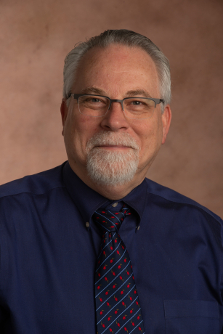
When he arrived in Kalamazoo more than seven years ago, Dale D. Vandré, PhD, was a “department of one,” handpicked to lead a fledgling Department of Biomedical Sciences at what was then a brand new medical school.
Now, as he prepares to conclude a career as an educator and researcher that has spanned more than 40 years, Dr. Vandré will leave WMed having built a burgeoning research program, a successful MD curriculum and a department that, by later this year, will boast more than 15 faculty.
“I’ve hired more than 20 faculty and we’ve created a curriculum that didn’t exist,” said Dr. Vandré. “So, the change has been pretty phenomenal in the past seven years.”
Dr. Vandré had already amassed an impressive resumé when he was hired in 2012 by the medical school’s founding dean, Dr. Hal B. Jenson, to be the founding chair of the Department of Biomedical Sciences. At that time, Dr. Vandré had spent more than 20 years at The Ohio State University College of Medicine where he had his own research lab, was the director of the College of Medicine and Davis Heart and Lung Research Institute Proteomics Core Facility, and served as the vice chair of the Department of Physiology and Cell Biology, as well as assistant dean for Basic Science and director of the Integrated Pathway Program for medical education.
A biochemist and cell biologist, Dr. Vandré earned his PhD from the University of Iowa. His research career included work with identification and characterization of novel cancer chemotherapeutic agents, the molecular regulation of microtubules and control of cell division, Alzheimer’s disease, and the functional cellular biology of the human placenta. His efforts garnered consistent funding from the National Institutes of Health (NIH) and the National Science Foundation (NSF).
While at Ohio State, Dr. Vandré co-chaired a committee charged with redesigning the curriculum at the College of Medicine. As part of that leadership role, Dr. Vandré researched what new medical schools were doing with curriculum development and design, and came across the department chair position at WMed.
“I found it while trolling new medical school websites,” he said. “It was an opportunity to come to Kalamazoo, design a curriculum and build a department. That challenge is what attracted me.”
It was November 2012 when he made the move to WMed and he says that since that day, “I haven’t lacked for things to do.”
Indeed, in addition to building the MD curriculum and the Department of Biomedical Sciences, he served as the chair of the Admissions Committee, where he was involved in the recruitment of the first three medical student classes at WMed. He also served a short stint as director of the WMed Innovation Center in 2016 and that same year he was appointed associate dean for Research, a new title that brought with it the task of building research programs and opportunities at the medical school.
He also led efforts to bring about the Master of Science in Biomedical Sciences Program, which supports WMed’s mission to build a diverse and inclusive environment that will serve the medical needs of the community. The program is designed specifically for WMed applicants who have strength in their pre-medical experiences and attributes, and would benefit from additional basic science preparation before beginning medical school. A distinct benefit built into the program is its linkage to the MD program and accepted students are conditionally accepted to the MD program for the following year.
Dr. Vandré’s work as the associate dean for Research led to the recruitment of well-known physician and researcher Thomas L. Rothstein, MD, PhD, and the creation of the Center for Immunobiology at WMed in 2016. Additionally, he led efforts to build the medical school’s vivarium, toxicology services, and Institutional Review Board, as well as the Program in Medical Engineering.
Research efforts at the medical school have also flourished through the launch of the Pilot Research Project Support Program at WMed, a venture that began in 2017 under Dr. Vandré’s guidance. The program was implemented to support internal research at the medical school with the aim of engaging students and residents in projects with the potential to garner extramural funding.
Most recently, a research project led by Erik Larson, PhD, associate professor in the Department of Biomedical Sciences, that received funding support from the pilot program, was awarded a three-year, $340,000 R15 grant by the National Institute of Diabetes and Digestive and Kidney Diseases (NIDDK), which is part of the NIH.
“To me, it’s unbelievable the amount of change that happened in seven years,” Dr. Vandré said. “I think the thing that I’ve had the most success with are the people that I’ve hired. They are what makes the Department of Biomedical Sciences so special.
“They are high-quality faculty and they are really dedicated to pushing our teaching and research mission forward,” he added.
As his time at WMed comes to an end – his last day on the job is Friday, February 21 – Dr. Vandré said it is those he has had the opportunity to bring on board and work directly with at WMed that he is most proud of. Many faculty within the Department of Biomedical Sciences, despite the short time that WMed has been in existence, have already acquired leadership roles within national and international teaching and research organizations, he said.
He reminisced that when he came to WMed in 2012 and began recruiting faculty many of the new hires gave up research labs and tenure in exchange for the challenge of helping build a successful program at a new medical school. Since then, the reputation of WMed has grown exponentially thanks to their efforts, he said.
“When new faculty come here, they see what has been created and how our team works together, and they want to be a part of it,” Dr. Vandré said. “They see the dynamic and want to be a part of it. The program is successful and our students are successful.”
